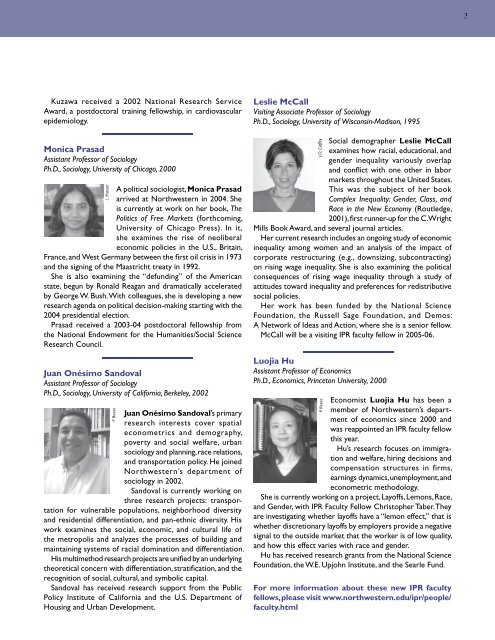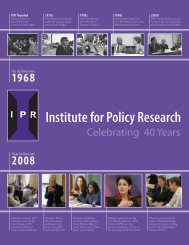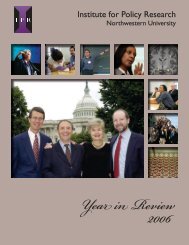Whatever Happened to the Emerging Democratic Majority?
Whatever Happened to the Emerging Democratic Majority?
Whatever Happened to the Emerging Democratic Majority?
Create successful ePaper yourself
Turn your PDF publications into a flip-book with our unique Google optimized e-Paper software.
L. Prasad<br />
P. Reese<br />
J.O. Coffey<br />
P. Reese<br />
3<br />
Kuzawa received a 2002 National Research Service<br />
Award, a postdoc<strong>to</strong>ral training fellowship, in cardiovascular<br />
epidemiology.<br />
Monica Prasad<br />
Assistant Professor of Sociology<br />
Ph.D., Sociology, University of Chicago, 2000<br />
A political sociologist, Monica Prasad<br />
arrived at Northwestern in 2004. She<br />
is currently at work on her book, The<br />
Politics of Free Markets (forthcoming,<br />
University of Chicago Press). In it,<br />
she examines <strong>the</strong> rise of neoliberal<br />
economic policies in <strong>the</strong> U.S., Britain,<br />
France, and West Germany between <strong>the</strong> fi rst oil crisis in 1973<br />
and <strong>the</strong> signing of <strong>the</strong> Maastricht treaty in 1992.<br />
She is also examining <strong>the</strong> “defunding” of <strong>the</strong> American<br />
state, begun by Ronald Reagan and dramatically accelerated<br />
by George W. Bush. With colleagues, she is developing a new<br />
research agenda on political decision-making starting with <strong>the</strong><br />
2004 presidential election.<br />
Prasad received a 2003-04 postdoc<strong>to</strong>ral fellowship from<br />
<strong>the</strong> National Endowment for <strong>the</strong> Humanities/Social Science<br />
Research Council.<br />
Juan Onésimo Sandoval<br />
Assistant Professor of Sociology<br />
Ph.D., Sociology, University of California, Berkeley, 2002<br />
Juan Onésimo Sandoval’s primary<br />
research interests cover spatial<br />
econometrics and demography,<br />
poverty and social welfare, urban<br />
sociology and planning, race relations,<br />
and transportation policy. He joined<br />
Northwestern’s department of<br />
sociology in 2002.<br />
Sandoval is currently working on<br />
three research projects: transportation<br />
for vulnerable populations, neighborhood diversity<br />
and residential differentiation, and pan-ethnic diversity. His<br />
work examines <strong>the</strong> social, economic, and cultural life of<br />
<strong>the</strong> metropolis and analyzes <strong>the</strong> processes of building and<br />
maintaining systems of racial domination and differentiation.<br />
His multimethod research projects are unified by an underlying<br />
<strong>the</strong>oretical concern with differentiation, stratifi cation, and <strong>the</strong><br />
recognition of social, cultural, and symbolic capital.<br />
Sandoval has received research support from <strong>the</strong> Public<br />
Policy Institute of California and <strong>the</strong> U.S. Department of<br />
Housing and Urban Development.<br />
Leslie McCall<br />
Visiting Associate Professor of Sociology<br />
Ph.D., Sociology, University of Wisconsin-Madison, 1995<br />
Social demographer Leslie McCall<br />
examines how racial, educational, and<br />
gender inequality variously overlap<br />
and confl ict with one o<strong>the</strong>r in labor<br />
markets throughout <strong>the</strong> United States.<br />
This was <strong>the</strong> subject of her book<br />
Complex Inequality: Gender, Class, and<br />
Race in <strong>the</strong> New Economy (Routledge,<br />
2001), first runner-up for <strong>the</strong> C. Wright<br />
Mills Book Award, and several journal articles.<br />
Her current research includes an ongoing study of economic<br />
inequality among women and an analysis of <strong>the</strong> impact of<br />
corporate restructuring (e.g., downsizing, subcontracting)<br />
on rising wage inequality. She is also examining <strong>the</strong> political<br />
consequences of rising wage inequality through a study of<br />
attitudes <strong>to</strong>ward inequality and preferences for redistributive<br />
social policies.<br />
Her work has been funded by <strong>the</strong> National Science<br />
Foundation, <strong>the</strong> Russell Sage Foundation, and Demos:<br />
A Network of Ideas and Action, where she is a senior fellow.<br />
McCall will be a visiting IPR faculty fellow in 2005-06.<br />
Luojia Hu<br />
Assistant Professor of Economics<br />
Ph.D., Economics, Prince<strong>to</strong>n University, 2000<br />
Economist Luojia Hu has been a<br />
member of Northwestern’s department<br />
of economics since 2000 and<br />
was reappointed an IPR faculty fellow<br />
this year.<br />
Hu’s research focuses on immigration<br />
and welfare, hiring decisions and<br />
compensation structures in firms,<br />
earnings dynamics, unemployment, and<br />
econometric methodology.<br />
She is currently working on a project, Layoffs, Lemons, Race,<br />
and Gender, with IPR Faculty Fellow Chris<strong>to</strong>pher Taber. They<br />
are investigating whe<strong>the</strong>r layoffs have a “lemon effect,” that is<br />
whe<strong>the</strong>r discretionary layoffs by employers provide a negative<br />
signal <strong>to</strong> <strong>the</strong> outside market that <strong>the</strong> worker is of low quality,<br />
and how this effect varies with race and gender.<br />
Hu has received research grants from <strong>the</strong> National Science<br />
Foundation, <strong>the</strong> W.E. Upjohn Institute, and <strong>the</strong> Searle Fund.<br />
For more information about <strong>the</strong>se new IPR faculty<br />
fellows, please visit www.northwestern.edu/ipr/people/<br />
faculty.html
















